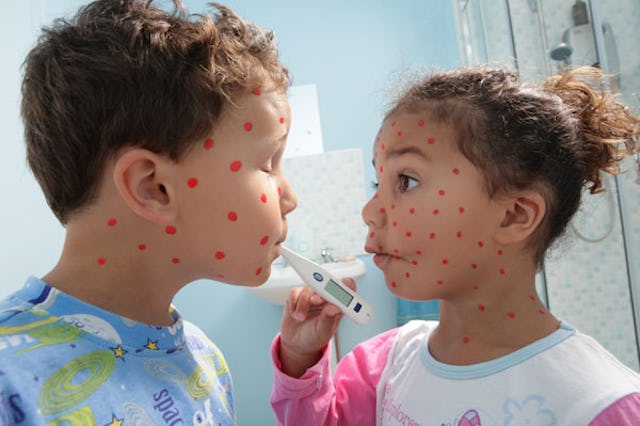I Googled 'Chicken Pox' And Learned Something About Race

My experience of motherhood from the liminal space of raising Black children while white has taught me how our world centers on white experiences of parenting.
Turning to Google when I suspected my biracial then-one-year-old baby of having chicken pox nearly three years ago, a Google search seemed a sensible first port of call. Searches of “Chicken Pox,” “Chicken Pox in babies,” “Chicken Pox in children,” or any combination of similar words–and even “Chicken Pox on dark skin”–brought up only pictures of the typical spotted rash on the skin of white children. Parents raising Black and Brown children will know, the way rashes and skin conditions present on darker-skinned children cannot be compared to the appearance of the same on white children.
To the extent that Googling is a means to answer (or attempt to answer) a world of burning parenting questions, it couldn’t answer this one. Having been failed by the apparent inherent white supremacy of the Google image search, I deferred my question instead to two friends: a white friend who is a mother of two biracial sons, and a Black friend whose son is also of mixed — mostly Black — heritage. I knew from memory that both friends had the experience of chicken pox and that all three children between my two friends had skin tones similar to that of my daughter.
Having asked both mothers to weigh in on my suspicion, both agreed with my assessment of chicken pox (one shared a picture of her son’s chicken pox rash with a very similar presentation). A white pharmacist had earlier dismissed my concerns, in telling me the rash looked like an allergic reaction, insisting to me it wasn’t indicative of chicken pox. A Black doctor was later able to confirm it was the pox all along.
The spaces in which I’ve attempted to seek support or information as a mother are too frequently where I have found instead that my experiences of motherhood — specifically the intersection of mothering Black children — have been marginalized in ways they wouldn’t have been having I spent the last four years raising white children.
As with the pharmacist who couldn’t recognize the rash on my daughter’s melanated skin, a doctor at my six-week postpartum checkup for my son over a year after that incident questioned the presence of a blue-grey spot birthmark on my son’s tailbone which he assumed was a bruise. Blue-grey spot birthmarks (historically called “Mongolian Blue Spots”–the term itself another example of white supremacy and colonialism in medical education) are more commonly seen in babies of African and Asian descent than they are in white babies.
Beyond the fact that a doctor confusing a birthmark as a bruise could flag safeguarding concerns and have implications for the involvement of social services (and I’ve no doubt had I not been a white mother with a dark-skinned child, but rather a Black or Brown mother, this outcome could have been far more likely), many serious medical conditions from sepsis to skin cancer appear first on the skin. A doctor not recognizing the signs of ill-health as they present on the skin is like the implications of a medical professional who can’t recognize the presentation of common skin conditions in darker skin is far-reaching.
Surely a doctor who is unable to diagnose the presence of conditions as they appear on the skin is as effective as one who can’t make an assessment of the heart or lungs?
I started with chicken pox but it isn’t about that. I can’t trust that our healthcare system isn’t inherently precluding my children from accessing a consistently high standard of care because of the color of their skin — or, rather, not because of the color of their skin, but because of a system inherently prejudiced against them because of it — and neither can I rely on the most used search engine in the world to give me internet search results that don’t inherently center white experience.
I’ve hesitated to share these incidents with white mothers directly because (along with a number of other similar encounters with white mothers), I’ve had a white mother tell me she understood how I felt about my daughter being called the n-word twice before she was two years old–because her own red-headed child had been called “ginger.” The mother’s intent notwithstanding — I’m sure she was intending to empathize — the impact of it was to center whiteness and white experiences, just as with the chicken pox situation, just as with so many other things I don’t have the mental bandwidth to break-down in writing.
None of this will be a surprise to Black and Brown mothers and fathers navigating similar experiences, but mothers and fathers of white children who benefit most from support and resources that others are often excluded from, and professionals and services whose business it is to provide support to parents and children — need to hear this. We need to stop centering white experiences of parenting. These anecdotes are barely a drop in an ocean of racism. I’m just trying to keep my kids above water.
This article was originally published on